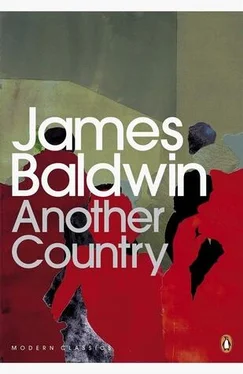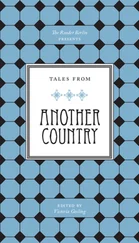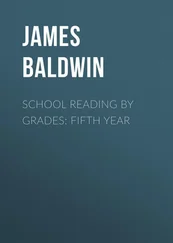You got to remember,” he said, gently, “he was trying . Ain’t many trying and all that tries must suffer. Be proud of him. You got a right to be proud. And that’s all he ever wanted in this world.”
Except for someone — a man — weeping in the front row, there was silence all over the chapel. Cass thought that the man must be Rufus’ father and she wondered if he believed what the preacher said. What had Rufus been to him? — a troublesome son, a stranger while living and now a stranger forever in death. And now nothing else would ever be known. Whatever else had been, or might have been, locked in Rufus’ heart or in the heart of his father, had gone into oblivion with Rufus. It would never be expressed now. It was over.
“There’re some friends of Rufus’s here,” said Reverend Foster, “and they going to play something for us and then we going to go.”
Two young men walked up the aisle, one carrying a guitar, one carrying a bass fiddle. The thin dark girl followed them. The black-robed boy at the piano flexed his fingers. The two boys stood directly in front of the covered corpse, the girl stood a little away from them, near the piano. They began playing something Cass did not recognize, something very slow, and more like the blues than a hymn. Then it began to be more tense and more bitter and more swift. The people in the chapel hummed low in their throats and tapped their feet. Then the girl stepped forward. She threw back her head and closed her eyes and that voice rang out again:
Oh, that great getting-up morning,
Fare thee well, fare thee well!
Reverend Foster, standing on a height behind her, raised both hands and mingled his voice with hers:
We’ll be coming from every nation,
Fare thee well, fare thee well!
The chapel joined them, but the girl ended the song alone:
Oh, on that great getting-up morning,
Fare thee well, fare thee well!
Then Reverend Foster prayed a brief prayer for the safe journey of the soul that had left them and the safe journey, throughout their lives and after death, of all the souls under the sound of his voice. It was over.
The pallbearers, two of the men in the front row, and the two musicians, lifted the mother-of-pearl casket to their shoulders and started down the aisle. The mourners followed.
Cass was standing near the door. The four still faces passed her with their burden and did not look at her. Directly behind them came Ida and her mother. Ida paused for a moment and looked at her — looked directly, unreadably at her from beneath her heavy veil. Then she seemed to smile. Then she passed. And the others passed. Vivaldo joined her and they walked out of the chapel.
For the first time she saw the hearse, which stood on the Avenue, facing downtown.
“Vivaldo,” she asked, “are we going to the cemetery?”
“No,” he said, “they don’t have enough cars. I think only the family’s going.”
He was watching the car behind the hearse. Ida’s parents had already entered the car. She stood on the sidewalk. She looked around her, then walked swiftly over to them. She took each of them by one hand.
“I just wanted to thank you,” she said, quickly, “for coming.” Her voice was rough from weeping and Cass could not see her face behind the veil. “You don’t know what it means to me — to us.”
Cass pressed Ida’s hand, not knowing what to say. Vivaldo said, “Ida, anything we can do — anything I can do— anything —!”
“You’ve done wonders. You been wonderful. I’ll never forget it.”
She pressed their hands again and turned away. She got into the car and the door closed behind her. The hearse slowly moved out from the curb, and the car, then a second car, followed. Others who had been at the funeral service looked briefly at Cass and Vivaldo, stood together a few moments, and then began to disperse. Cass and Vivaldo started down the Avenue.
“Shall we take a subway?” Vivaldo asked.
“I don’t,” she said, “think I could face that now.”
They continued to walk, nevertheless, aimlessly, in silence. Cass walked with her hands deep in her pockets, staring down at the cracks in the sidewalk.
“I hate funerals,” she said, finally, “they never seem to have anything to do with the person who died.”
“No,” he said, “funerals are for the living.”
They passed a stoop where a handful of adolescents stood, who looked at them curiously.
“Yes,” she said. And they kept walking, neither seeming to have the energy it would have demanded to stop and hail a cab. They could not talk about the funeral now; there was too much to say; perhaps each had too much to hide. They walked down the wide, crowded Avenue, surrounded, it seemed, by an atmosphere which prevented others from jostling them or looking at them too directly or for too long a time. They reached the mouth of the subway at 125th Street. People climbed up from the darkness and a group of people stood on the corner, waiting for the bus.
“Let’s get that cab,” she said.
Vivaldo hailed a cab and they got in — as, she could not help feeling they had been expected to do — and they began to roll away from the dark, the violent scene, over which, now, a pale sun fell.
“I wonder,” he said. “I wonder.”
“Yes? What do you wonder?”
Her tone was sharper than she had intended, she could not have said why.
“What she means when she says she’ll never forget it.”
Something was going on in her mind, something she could not name or stop; but it was almost as though she were her mind’s prisoner, as though the jaws of her mind had closed on her.
“Well, at least that proves that you’re intelligent,” she said. “Much good may it do you.” She watched the cab roll down the Avenue which would eventually turn into the Avenue she knew.
“I’d like to prove to her — one day,” he said; and paused. He looked out of the window. “I’d like to make her know that the world’s not as black as she thinks it is.”
“Or,” she said, dryly, after a moment, “as white.”
“Or as white,” he said, mildly. She sensed that he was refusing to react to her tone. Then he said, “You don’t like her — Ida.”
“I like her well enough. I don’t know her.”
“I guess that proves my point,” he said. “You don’t know her and you don’t want to know her.”
“It doesn’t matter whether I like Ida or not,” she said. “The point is, you like her. Well, that’s fine. I don’t know why you want me to object. I don’t object. But what difference would it make if I did?”
“None,” he said, promptly. Then, “Well, some. I’d worry about my judgment.”
“Judgment,” she said. “has nothing to do with love.”
He looked at her sharply, but with gratitude, too. “For it’s love we’re talking about—?”
“For what you seem to be trying to prove,” she said, “It had better be.” She was silent. Then she said, “Of course, she may also have something to prove.”
“I think she has something to forget,” he said. “I think I can help her forget it.”
She said nothing. She watched the cold trees and the cold park. She wondered how Richard’s work had gone that morning; she wondered about the children. It seemed, suddenly, that she had been away a long time, had failed very great obligations. And all she wanted in the world right now was to get home safely and find everything as she had left it — as she had left it so long ago, this morning.
“You’re so juvenile,” she heard herself saying. She was using her most matronly tone. “You know so little”—she smiled—“about life. About women.”
Читать дальше












